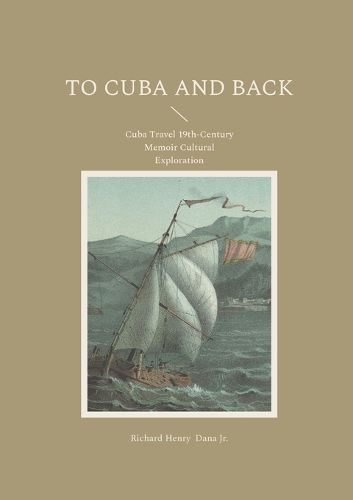Readings Newsletter
Become a Readings Member to make your shopping experience even easier.
Sign in or sign up for free!
You’re not far away from qualifying for FREE standard shipping within Australia
You’ve qualified for FREE standard shipping within Australia
The cart is loading…






This title is printed to order. This book may have been self-published. If so, we cannot guarantee the quality of the content. In the main most books will have gone through the editing process however some may not. We therefore suggest that you be aware of this before ordering this book. If in doubt check either the author or publisher’s details as we are unable to accept any returns unless they are faulty. Please contact us if you have any questions.
To Cuba and Back by Richard Henry Dana Jr. is a landmark 19th-century memoir that immerses readers in the vibrant world of mid-1800s Cuba. Setting out from the United States in 1859, Dana embarks on a Cuba travel adventure at a time when the island's fate was a subject of intense political debate. His journey aboard the steamer Cahawba leads him into the heart of colonial Cuba, where he documents the customs, landscapes, and daily life with a keen observer's eye. Dana's narrative is much more than a simple travel account. He provides a cultural exploration of Cuban society, delving into its traditions, educational systems, and the complexities of its colonial institutions. His observations extend to the darker realities of the era, including the widespread presence of slavery and the exploitation of both African and Chinese laborers. Dana's abolitionist perspective brings a critical lens to the social commentary woven throughout his memoir, as he exposes the harsh conditions of sugar plantations and the corruption of the island's prison system. The memoir is enriched by Dana's vivid descriptions of Havana's bustling streets, the island's picturesque countryside, and the warmth of the Cuban people. His encounters with locals, officials, and fellow travelers provide a nuanced portrait of a society on the brink of change. Through personal anecdotes and reflective passages, Dana confronts his own preconceptions, offering readers a journey of self-discovery alongside the exploration of a complex and fascinating land. To Cuba and Back stands as a bridge between cultures and a vital historical account, inviting readers to experience the beauty, contradictions, and enduring spirit of Cuba. This work is essential for those interested in travel narrative, historical account, and the transformative power of cross-cultural understanding.
$9.00 standard shipping within Australia
FREE standard shipping within Australia for orders over $100.00
Express & International shipping calculated at checkout
Stock availability can be subject to change without notice. We recommend calling the shop or contacting our online team to check availability of low stock items. Please see our Shopping Online page for more details.
This title is printed to order. This book may have been self-published. If so, we cannot guarantee the quality of the content. In the main most books will have gone through the editing process however some may not. We therefore suggest that you be aware of this before ordering this book. If in doubt check either the author or publisher’s details as we are unable to accept any returns unless they are faulty. Please contact us if you have any questions.
To Cuba and Back by Richard Henry Dana Jr. is a landmark 19th-century memoir that immerses readers in the vibrant world of mid-1800s Cuba. Setting out from the United States in 1859, Dana embarks on a Cuba travel adventure at a time when the island's fate was a subject of intense political debate. His journey aboard the steamer Cahawba leads him into the heart of colonial Cuba, where he documents the customs, landscapes, and daily life with a keen observer's eye. Dana's narrative is much more than a simple travel account. He provides a cultural exploration of Cuban society, delving into its traditions, educational systems, and the complexities of its colonial institutions. His observations extend to the darker realities of the era, including the widespread presence of slavery and the exploitation of both African and Chinese laborers. Dana's abolitionist perspective brings a critical lens to the social commentary woven throughout his memoir, as he exposes the harsh conditions of sugar plantations and the corruption of the island's prison system. The memoir is enriched by Dana's vivid descriptions of Havana's bustling streets, the island's picturesque countryside, and the warmth of the Cuban people. His encounters with locals, officials, and fellow travelers provide a nuanced portrait of a society on the brink of change. Through personal anecdotes and reflective passages, Dana confronts his own preconceptions, offering readers a journey of self-discovery alongside the exploration of a complex and fascinating land. To Cuba and Back stands as a bridge between cultures and a vital historical account, inviting readers to experience the beauty, contradictions, and enduring spirit of Cuba. This work is essential for those interested in travel narrative, historical account, and the transformative power of cross-cultural understanding.